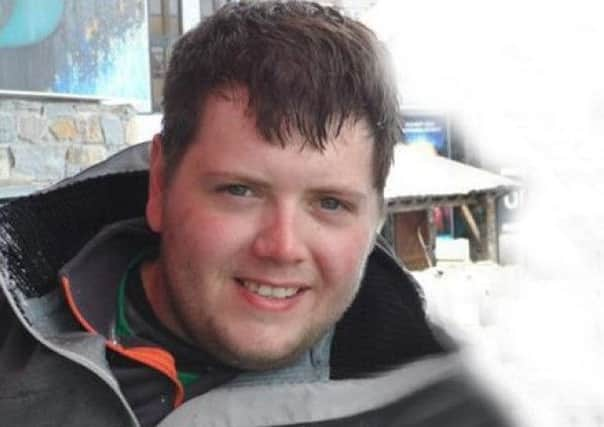Ben Lloyd inquest: jury returns its verdict


Ben Lloyd, “a young man with a zest for life”, died on December 21, 2013, after a VW Polo struck him at an unlit section of the motorway near junction 32 at around 3.42am.
Assistant coroner Kevin McLoughlin said Mr Lloyd was “walking in the wrong direction on the motorway even though he had £16 in his pocket to cover the cost of a taxi.”
Advertisement
Hide AdAdvertisement
Hide AdWest Yorkshire Police call handlers passed 999 reports about a man being seen on the M62 on to the Highways Agency with the lowest possible “standard” tag for response time.
Returning a narrative verdict on Friday, jurors concluded: “In relation to the West Yorkshire Police response, we conclude vulnerability should have been considered from the outset.
“The first 999 call at 3.20am clearly demonstrated a vulnerable person given the time, location and information contained with the call.
“It is unlcear whether this would have changed the outcome.”
Advertisement
Hide AdAdvertisement
Hide AdThe Wormersley electrician, who was 24, had been out drinking with friends in Pontefract on ‘Mad Friday’.
He was found to have been around 2.4 times over the legal drink driving limit.
Jurors also said that “the amount of alcohol consumed was a contributing factor.”
In the moments before the collision, Mr Lloyd had walked in various parts of the motorway showing signs of disorientation, the jury said.
Advertisement
Hide AdAdvertisement
Hide AdThey added that it is unclear how Mr Lloyd got from a BP garage, where a taxi left him, to an M62 slip road, where he was last seen before walking on to the motorway.
At around 2am he got in a taxi with Emma Gledhill and her friend outside Horse Vaults. He took out £50 from the NatWest on Ropergate for the fare.
The two women were dropped off by driver Mohammad Dawood in Castleford.
Speaking through an interpreter Mr Dawood previously told the inquest that he charged Mr Lloyd £12 and requested more to take him home to Womersley.
Advertisement
Hide AdAdvertisement
Hide AdThe driver said that Mr Lloyd had paid him for the journey with a £20 note and given him his £8 change.
However, Mr Lloyd was later found with £16 in his pockets.
At around 2.30am, Mr Lloyd went to use the cash machine at the BP garage on Park Row, near the M62. He had asked the driver to stop on the way so he could be sick.
Mr McLoughlin said: “He went to the cash point, back towards towards the car and went back to the cash point again.”
Believing Mr Lloyd was wasting his time, the driver left the garage, the hearing was told.
Advertisement
Hide AdAdvertisement
Hide AdMr Lloyd then went inside and bought something to eat before he was asked to leave so that staff could close the main part of the shop.
At around 3.40am Owen Gooden was driving the VW Polo in the middle lane of the westbound bend of the M62.
Front seat passenger Louis Francis spotted Mr Lloyd and said “What’s that guy doing?” just before the “inevitable” collision, the court heard.
Steven Green, who was a collision investigator with West Yorkshire Police, attended the scene at 5.05am that morning.
Advertisement
Hide AdAdvertisement
Hide AdHe told the inquest that the car would have been travelling at 50.2-57.2mph on impact and that Mr Gooden had around one second to respond to seeing Mr Lloyd in the road.
Before the collision Mr Lloyd was “stood still facing towards the hard shoulder.”
Three calls to police were later made from concerned motorists and passengers who had passed Mr Lloyd while he was walking on the hard shoulder of the westbound carriageway wearing dark clothing, between 3.20am and 3.37am.
Police call handlers passed the reports on to the Highways Agency with the lowest possible “standard” tag – because this is the policy when passing leads between the two authorities.
Advertisement
Hide AdAdvertisement
Hide AdChief Inspector Mark Jessop, of West Yorkshire Police, told the jury that due to the way police pass on emergency calls to the Highways Agency, the initial 999 report on Mr Lloyd being spotted walking on the motorway was given a “standard” tag, which only requires a response within four hours.
By contrast, ‘emergency’ requires a 15 minute response, with ‘priority’ calls needing a one-hour turnaround.
The grading policy applies to all reports of pedestrians walking on motorways – and police would only deal with an on going crime or fatal collision.
Chief Inspector Jessop said: “West Yorkshire Police deals with approximately 20 pedestrians walking on the motorway per week. The degree of vulnerability is subjective.”
Advertisement
Hide AdAdvertisement
Hide AdThe jury said it is unclear whether the police’s response to the first 999 call would have changed the outcome of what happened.
After the Highway Agency received the lead it was designated an immediate grading. Speed limits on that stretch of the motorway were lowered to 50mph and a message on a gantry road sign told drivers there were pedestrians on the road.
Mr McLoughlin thanked Mr Lloyd’s family for the “very dignified way” they conducted themselves during the hearing.